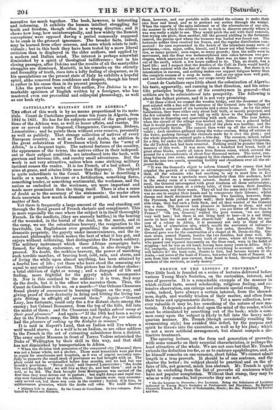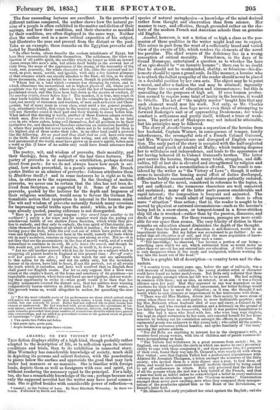TRENCH ON THE LESSONS IN PROVERBS. * Tins little book is
founded on a series of lectures delivered before various Young Men's Societies, on the curiosities, interest, and uses of proverbs. It is a remarkable example of the manner in which critical taste, sound scholarship, religious feeling, and ex- tensive observation, can enlarge and animate special reading. Pro- verbs, indeed, have always a certain interest, from the shrewd- ness, depth, and worldly wisdom of their matter, and often from their terse and epigrammatic diction. Yet a mere collection, how- ever valuable it may be, has something of the nature of raw ma- terials. It depends a good deal upon the mind of the reader, which must be stimulated by something out of the book; while a com- mon essay upon the subject is likely to fall into the heavy anti- quarian manner. Mr. Trench (though occasionally recalling the sermonizing style) has avoided this defect, by the purpose and spirit he throws into the execution, as well as by his plan ; which is not a mere artificial arrangement, but almost compels a dis- tinctive treatment.
The opening lecture, on the form and generation of proverbs, with some remarks on their essential characteristics, is perhaps the least attractive of the whole. We are not sure but that Mr. Trench extends the definition too far, so as to embrace apophthegms, and, as he himself remarks on one occasion short fables. We cannot admit length in a true proverb. It should be of one sentence, and the shorter the better ; its subject should be practical and on the af- fairs of life, not general, much less abstract. Mr. Trench is quite right in excluding from the list of proverbs all sentences which have not popular acceptation. Without that stamp, they may be wise or witty remarks, but proverbs they are not.
• On the Lessons in Proverbs : five Lectures. Being the Substance of Lectures delivered to Young Men's Societies at Portsmouth and Elsewhere. By Richard Chennis Trench, B.D., Vicar of Itchenstoke, Hants; Ste. Ike. Published by Parker and Son. The four succeeding lectures are excellent. In the proverbs of different nations compared, the author shows how the natural ge- nius of a people is often exhibited in the matter and diction of their saying!, and how their condition, and their character as moulded by their condition, are often displayed in the same way. Neither does the author rest in a mere critical exposition of his subject, but illustrates the near and present from the distant or the past. Take as an example, these remarks on the Egyptian proverbs col- lected by Burckhardt. "In other books, others describe the modern inhabitants of Egypt, but here they unconsciously describe themselves. The selfishness, the utter ex- tinction of all public spirit, the servility which no longer as with an inward shame creeps into men 'ii acts, but utters itself boldly as the avowed law of their lives, the sense of the oppression of the strong, of the insecurity of the weak, and, generally, the whole character of life, alike the outward and in- ward, as poor, mean, sordid, and ignoble, with only a few faintest glimpses of that romance which one usually attaches to the East; all this, as we study these documents, rises up before us in truest, though in painfullest, outline. "Where but ,in a land which evermore was changing its rulers, and in which oftentimes the unworthiest sat in highest places of all, whom yet to propitiate was the only safety, where else could the law of baseness have been proclaimed aloud, and this have been laid down as the maxim of conduct, If the monkey reigns, dance before him t The monkey, it is true, may reign. in other lands besides those of the East ; but the examples in a neighbouring land, not merely of statesmen and warriors, of men such as Guizot and Chan- gamier, but of many more in every class, erect amid a too general prostra- tion abundantly testify, that reign as the monkey. may, simia in purpur3., all
'will therefore count it their part and their wisdom to dance before him. What indeed this dancing is worth, another of those Eastern adages reveals, which says, Kiss the hand which thou canal not bite. Again, in no land save in one where rulers, being evil themselves, feel all goodness to be their instinctive foe, and themselves therefore entertain an instinctive hostility to it, where they punish but never reward, where not to be noticed by them is the highest ann of those under their yoke, in no other land could a proverb like the following, .Do no good and thou shalt find no evil, have ever come to the birth. How settled a conviction that wrong, and not right, was the lord paramount of the world, must have grown up in men's spirits, before such a word as this (I know of no sadder one) could have found utterance from their lips."
The poetry, wit, and wisdom of proverbs' their morality, and their theology, form the subject of the last three lectures. The poetry of proverbs is of necessity a scintillation, perhaps derived direct from poets ; for we do not always know how much is ori- ginal, how much proverbial, in a poem's sentences. Mr. Trench quotes Butler as an admirer of proverbs: Tohnson attributes them to Hudibras itself ;1- and in some instances he is right as to the idea, in others as to the expression. In the theology of modern proverbs we never can be certain that the idea has not been de- rived from Scripture, or suggested by it. Some of the ancient proverbs, voted by the lecturer for the depth and largeness of their religious sentiment, would seem to favour the German Ra- tionalistic notion that inspiration is internal in the human mind. The wit and wisdom of proverbs naturally furnish many occasions for impressing useful truths upon the mind; while, as in the pas- sage already quoted, passing reference is not disregarded. Here is a proverb of many tongues : One sword keeps another in its scabbard! surely a far wiser and far manlier word than the puling yet mischievous babble of our shallow Peace Societies, which while they pro- fess to embody, and they only to embody, the true spirit of Christianity, pro- claim themselves in fact ignorant of all which it teaches ; for they dream of having peace the fruit, while the evil root out of which have grown all the wars and fightings that have ever been in the world, namely the lusts which stir in men's members, remains as vigorous and strong as ever. Not so—it is not they that are the peacemakers: in the face of an evil world, and of a world determined to continue in its evil, He who bears the sword, and though he fain would not, yet knows how, if need be, to wield it, he bears peace. f "Let me add another proverb which has its bearing on a subject which is occupying all patriot hearts in England at this present time : .Far-of water will not quench near fire. II They who watch for and are answerable to this nation for its safety., and not its safety only, but the inviolated honour of its shores, have laid to heart, if not the proverb, yet at all events the truth which it embodies, and have well resolved that an English fleet shall guard our English coasts. For let us only suppose that a blow were struck at the empire's heart, at the home and sanctuary of its greatness—no improbable supposition, when force and fraud are met together, and are watch- ing their opportunity to strike it—what profit would it be then that her mighty armaments covered the distant seas, that her soldiers were winning comparatively barren victories in Africa and India ? The far-off water, as this proverb warns us, would altogether be useless for quenching the near fire.'' ft "But the most valuable parts of his performance are those which retired study and native wit cannot supply. He that merely makes a book from others may be useful, but can scarcely be great. Butler had not suffered life to glide beside him unseen or unobserved. He had watched with great diligence the operations of hu- man nature, and traced the effects of opinion, humour, interest, and passion. From such remarks proceeded that great number of sententious distichs which have passed into conversation, and are added as proverbial axioms to the general stock of practi- cal knowledge."— Life of Butler.]
Una spada tien Petra nel fodro.
Qui porte gpee, porte
fl Acqua lantana non spegne fuoco ticino.



























 Previous page
Previous page